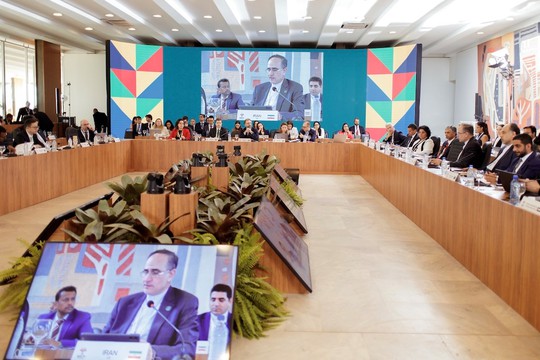BRICS Sherpa meeting.
Photo: BRICS Brasil
In January 2025, Indonesia – the world’s fourth-largest country by population (282 million) with the seventh-largest Gross Domestic Product by purchasing power parity – joined the BRICS+ bloc. Eleven countries are now in this expanded grouping. With the expansion of BRICS to more countries of the Global South, a revival of the “Bangdung Spirit” is taking place, not without its contradictions and fresh challenges, notes Vijay Prashad, an Indian historian, editor, and journalist, a writing fellow and chief correspondent at Globetrotter.
Talk of South-South cooperation in the decades before 2009 had not been taken too seriously; but after the financial crisis morphed into a long period of low growth rates, impacted deeply by the COVID-19 pandemic and the war in Ukraine, it became clear that South-South trade might be the way out for the large economies of the Global South. It made sense to expand the BRICS with the addition of the major energy-producing countries (Iran, Saudi Arabia, and the United Arab Emirates) as well as large economies in their regions (Egypt, Ethiopia, and now Indonesia).
Indonesia’s entry into the BRICS+ comes during the 70th anniversary year of the Asian-African Conference held in Bandung, Indonesia in 1955. That conference generated what was then called the ‘Bandung Spirit’, a sensibility for the need of the newly freed countries from colonialism to set their own path for development. The communiqué that was published on the last day of the 1955 conference called for the ‘promotion of mutual interests and cooperation’, which would later be known as South-South Cooperation.
The Bandung process created two institutions to carry forward this principle: the Non-Aligned Movement (NAM), formed in 1961, and the United Nations Conference on Trade and Development (UNCTAD), formed in 1964. While the NAM pushed for an agenda of peace against the Cold War, UNCTAD tried to forge an agenda for development. These two terms – peace and development – framed the Bandung Spirit. Whereas the advancement of both had been curtailed for the poorer countries of the world over the past seven decades, the emergence of the BRICS+ revives some of that hope from 1955.
Nickel is a metal that is found in two types of ores – sulphides and laterites. It became a key part of the world’s industries with the growth of the stainless-steel industry (about two-thirds of global nickel production is still used to make stainless-steel that is used in everything from building construction to medical equipment). With the pressure to decarbonize, there has been greater interest in the role of nickel in producing lithium-ion batteries for high-performance electric vehicles. The best quality nickel – Class 1 – is found in Russia, Canada, and Australia, where the nickel comes from sulphide ores. Indonesia is the world’s largest nickel producer, but it produces Class 2 nickel from laterite ores (and so sells mainly into the stainless steel market). Chinese private companies such as Zhejiang Huayou Cobalt have built large High-Pressure Acid Leach (HPAL) facilities in Indonesia to convert laterite into battery-grade nickel. If the process of HPAL scales up, it would make Indonesia the largest producer of Class 1 nickel by 2030.
In 2019, the European Union, which only buys two percent of the unprocessed ore from Indonesia, filed a lawsuit in the World Trade Organization against Indonesia’s nickel ore export ban. The Europeans said that the ban was ‘against WTO rules’. In November 2022, the WTO agreed with the European Union, and the following month, Indonesia appealed against this decision. In the absence of a proper appellate body, the case lies in limbo. But it is characteristic of the dilemma: Indonesia attempts to peacefully develop its economy by exerting its sovereignty over its own raw materials – as per the Bandung Spirit – and the European Union – which includes The Netherlands, Indonesia’s former colonial ruler – decides to prevent such development.
Indonesia will host a low-profile event to celebrate the 70th anniversary of the Bandung Conference in June. The ‘Bandung Spirit’ is not being widely advertised these days, partly because of the lingering internal problems among Global South states. It seems far more logical to simply allow the contradictions of the present to generate their own new spirit, with the fight to establish sovereignty over a nation’s resources at the centre of this new mood.
read more in our Telegram-channel https://t.me/The_International_Affairs

 10:46 02.05.2025 •
10:46 02.05.2025 •























